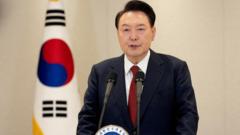A Seoul court has issued an arrest warrant for suspended president Yoon Suk Yeol, regarding his controversial declaration of martial law on December 3. This unprecedented step, following multiple ignored summonses for questioning, stems from accusations of insurrection and abuse of power. Yoon’s legal representative rejected the proceedings as “illegal,” asserting that the president's martial law declaration falls within his constitutional rights.
Since the issuance of the warrant, South Korea has been embroiled in a significant political crisis, marked by the impeachment of both Yoon and his successor by the parliament. This situation is particularly notable as Yoon is the first sitting president in South Korean history targeted for arrest. The court order allows investigators a 48-hour period to detain Yoon for further questioning.
However, the execution of the arrest remains uncertain. President Yoon is reportedly shielded by a robust security team and a wave of supporters and protesters that have historically hindered law enforcement from executing similar warrants against prominent political figures in the past. Notably, there were previous instances where police retreated during arrest attempts due to overwhelming physical opposition by aides and political supporters.
His legal counsel maintains that Yoon's absences from court were due to “legitimate concerns,” while his current whereabouts are not publicly known; the president is under a travel ban. Following the impeachment vote by lawmakers on December 14, Yoon has been suspended from presidential responsibilities, but he remains in office until the constitutional court decides on the fate of his impeachment.
The constitutional court, currently with only six judges on a nine-member bench, presents a challenging landscape for Yoon. A single judge’s rejection in the court could result in his being saved from removal. Meanwhile, opposition lawmakers are pressing for the nomination of three additional judges, a proposal that was vetoed recently by Prime Minister Han Duck-soo, who is now himself facing impeachment threats.
The turbulence within South Korea's political system reflects mounting divisions and a struggle for power, as investigations into Yoon's conduct continue amid public outcry and calls for accountability.


















